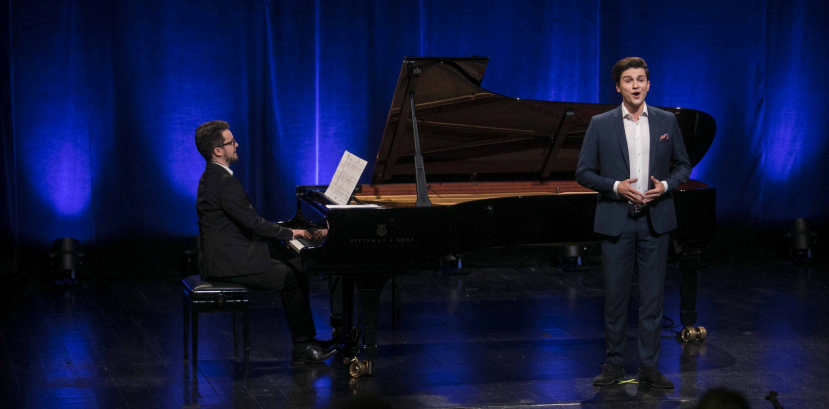Reviews written by Barbara Zamek of auditions of participants in the 1st stage of the 19th Ada Sari International Vocal Artistry Competition.
Jakub FOLTAK | countertenor
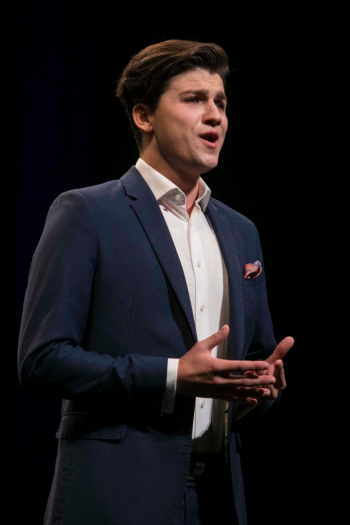 Countertenor Jakub Foltak opened the 19th edition of the competition with A. Vivaldi’s aria „Vedrò con mio diletto”. The 27 year old artist led the phrases with a subtle, round sound. He was accompanied by Aleksander Chodacki at the piano. The pianist styled his playing very well – under his fingers the piano made dry, short sounds and sounded like a baroque instrument. One could get the impression that the beginning of the performance was stressful for the singer because there was air in his voice. However, in the second piece, „Torna mio bene” by W. A. Mozart, the voice became more confident and resonant. The whole performance was characterized by great musicality and convincing interpretation.
Countertenor Jakub Foltak opened the 19th edition of the competition with A. Vivaldi’s aria „Vedrò con mio diletto”. The 27 year old artist led the phrases with a subtle, round sound. He was accompanied by Aleksander Chodacki at the piano. The pianist styled his playing very well – under his fingers the piano made dry, short sounds and sounded like a baroque instrument. One could get the impression that the beginning of the performance was stressful for the singer because there was air in his voice. However, in the second piece, „Torna mio bene” by W. A. Mozart, the voice became more confident and resonant. The whole performance was characterized by great musicality and convincing interpretation.
Iuliia FOMINA | mezzo-soprano
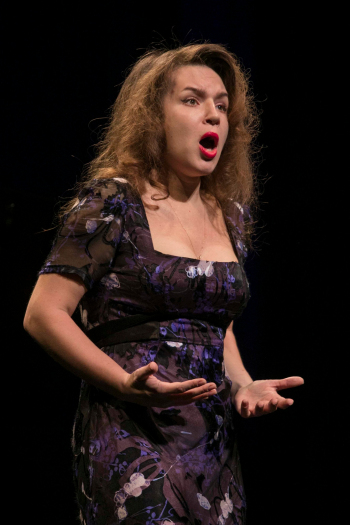 Iuliia Fomina, a Russian mezzo-soprano, began with an energetic song „Hopak” by M. Mussorgsky, after which she was asked by the Jury to perform W. A. Mozart’s aria „Va pure ad altri in braccio”. Her interpretation was clear and convincing. She has a dark and warm sounding voice. At times, her diction was not clear enough. It was evident that the young artist had a lot to say on stage and that a more stable technique would allow her more freedom in interpretation.
Iuliia Fomina, a Russian mezzo-soprano, began with an energetic song „Hopak” by M. Mussorgsky, after which she was asked by the Jury to perform W. A. Mozart’s aria „Va pure ad altri in braccio”. Her interpretation was clear and convincing. She has a dark and warm sounding voice. At times, her diction was not clear enough. It was evident that the young artist had a lot to say on stage and that a more stable technique would allow her more freedom in interpretation.
Justyna GĘSICKA | mezzo-soprano
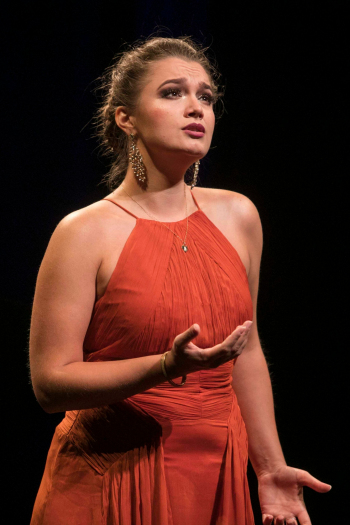 Mezzo-soprano Justyna Gęsicka started her performance with G. Rossini’s aria „Cruda sorte”. The soloist presented herself beautifully on stage. She sang expressively and delivered the text very well. Her voice has a beautiful timbre, but it doesn’t sound as full as it may in the future. At times, the soloist had problems with intonation, and one could hear air in the sound. In the second piece – „Ah scostati / Smanie implacabili” by W. A. Mozart, her voice seemed to reach its limits as she approached the top notes.
Mezzo-soprano Justyna Gęsicka started her performance with G. Rossini’s aria „Cruda sorte”. The soloist presented herself beautifully on stage. She sang expressively and delivered the text very well. Her voice has a beautiful timbre, but it doesn’t sound as full as it may in the future. At times, the soloist had problems with intonation, and one could hear air in the sound. In the second piece – „Ah scostati / Smanie implacabili” by W. A. Mozart, her voice seemed to reach its limits as she approached the top notes.
Kamila GOIK | soprano
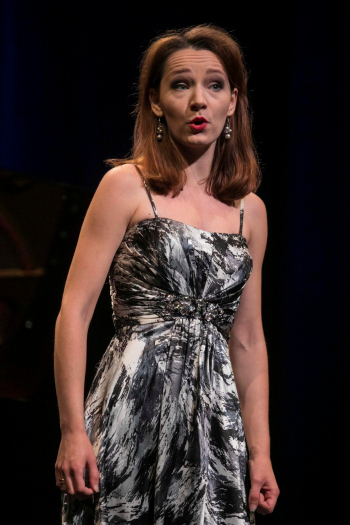 27 year old coloratura, Kamila Goik, perfectly interpreted her first aria – „Chacun le sait” by G. Donizetti. She kept the tension throughout all the pauses and led the phrases in an interesting way. In addition, she made use of the fact that the audience was situated so close to the stage and made eye contact with them. Her performance was suspenseful from start to finish. In the recitative and aria „Giunse alfin il momento / Al desio di chi t'adora”, she presented musicality and a whole range of colors in her voice. Thanks to that, one could see various emotions tormenting the character played by the artist.
27 year old coloratura, Kamila Goik, perfectly interpreted her first aria – „Chacun le sait” by G. Donizetti. She kept the tension throughout all the pauses and led the phrases in an interesting way. In addition, she made use of the fact that the audience was situated so close to the stage and made eye contact with them. Her performance was suspenseful from start to finish. In the recitative and aria „Giunse alfin il momento / Al desio di chi t'adora”, she presented musicality and a whole range of colors in her voice. Thanks to that, one could see various emotions tormenting the character played by the artist.
Marija GRINEVSKA | soprano
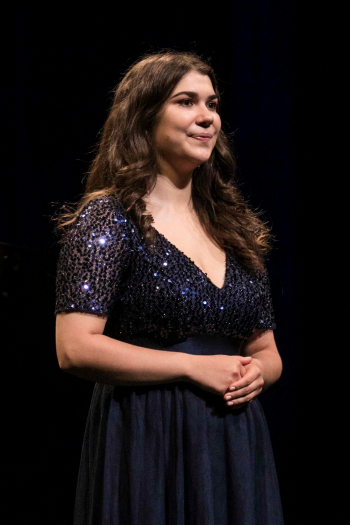 Latvian soprano Marija Grinevska presented G. Puccini's aria „Donde lieta usci”, followed by recitative and aria „Crudele! Ah no, mio bene! / Non mi dir, bell'idol mio” by W. A. Mozart. She sang with great culture and musicality. She led long legato phrases beautifully, but as she sang coloratures, she wasn’t able to keep an even tempo. The soloist also occasionally distorted some of the vowels.
Latvian soprano Marija Grinevska presented G. Puccini's aria „Donde lieta usci”, followed by recitative and aria „Crudele! Ah no, mio bene! / Non mi dir, bell'idol mio” by W. A. Mozart. She sang with great culture and musicality. She led long legato phrases beautifully, but as she sang coloratures, she wasn’t able to keep an even tempo. The soloist also occasionally distorted some of the vowels.
Michał JANICKI | baritone
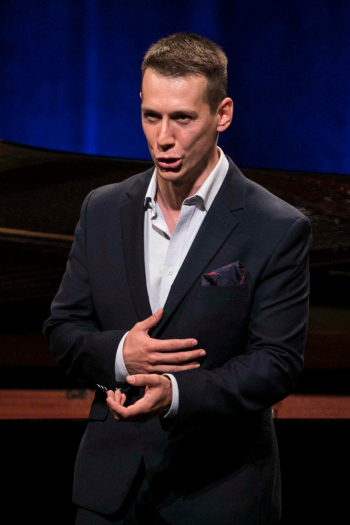 Baritone Michał Janicki presented himself in an excellently selected repertoire. He began with W. A. Mozart’s aria „Deh vieni alla finestra”, convincingly playing the character of Don Giovanni. He sang with a beautiful sound, sometimes overusing the portamento which are unnecessary in Mozart's music. The young artist impressively interpreted P. Mascagni's aria „Quell è una strada”. His Tartaglia stuttered so convincingly, that the audience couldn’t help but laugh.
Baritone Michał Janicki presented himself in an excellently selected repertoire. He began with W. A. Mozart’s aria „Deh vieni alla finestra”, convincingly playing the character of Don Giovanni. He sang with a beautiful sound, sometimes overusing the portamento which are unnecessary in Mozart's music. The young artist impressively interpreted P. Mascagni's aria „Quell è una strada”. His Tartaglia stuttered so convincingly, that the audience couldn’t help but laugh.
Nazarii KACHALA | tenor
 The Ukrainian tenor Nazaria Kachala performed the arias „Per pieta, non ricercate” by W. A Mozart and „Nessun dorma” by G. Puccini. The singer has a beautiful timbre. One can also see that he has something to say on stage. Unfortunately, the arias he had in his repertoire seem much too heavy for him at this point of his development.
The Ukrainian tenor Nazaria Kachala performed the arias „Per pieta, non ricercate” by W. A Mozart and „Nessun dorma” by G. Puccini. The singer has a beautiful timbre. One can also see that he has something to say on stage. Unfortunately, the arias he had in his repertoire seem much too heavy for him at this point of his development.
Patrycja KONFEDERAK | mezzo-soprano
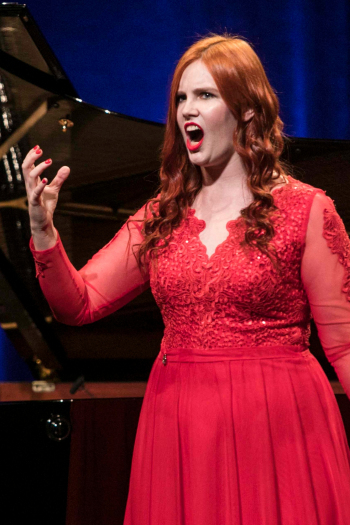 Mezzo-soprano Patrycja Konfederak made a statement at the moment she entered the stage. She stood out by the creativity in her styling – she adapted a red dress to the color of her hair. The soloist started her performance with G. Verdi’s aria „Stride la vampa” and then performed W. A. Mozart’s aria „Ah scostati / Smanie implacabili”. The singer has a beautiful voice, but one could hear a big vibrato in it. Perhaps this technical obstacle did not allow her to interpret freely.
Mezzo-soprano Patrycja Konfederak made a statement at the moment she entered the stage. She stood out by the creativity in her styling – she adapted a red dress to the color of her hair. The soloist started her performance with G. Verdi’s aria „Stride la vampa” and then performed W. A. Mozart’s aria „Ah scostati / Smanie implacabili”. The singer has a beautiful voice, but one could hear a big vibrato in it. Perhaps this technical obstacle did not allow her to interpret freely.
Esther KOPEL | soprano
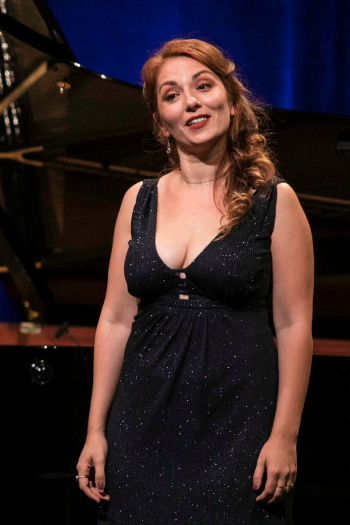 As her first piece, Israeli soprano Esther Kopel performed W. A. Mozart’s aria „Estinto è Idomeneo? ... Tutte nel cor vi sento”. One could see that the soloist felt confident on the stage. She delivered the text very well, although she chose a long aria based on uniform emotions – hence difficult to interpret. As the second piece, the jury chose „Otchevo eta priezdie ne znala” by P. Tchaikovsky. The artist did show a secure top in it, but there was not enough voice density to fill in long, flowing phrases.
As her first piece, Israeli soprano Esther Kopel performed W. A. Mozart’s aria „Estinto è Idomeneo? ... Tutte nel cor vi sento”. One could see that the soloist felt confident on the stage. She delivered the text very well, although she chose a long aria based on uniform emotions – hence difficult to interpret. As the second piece, the jury chose „Otchevo eta priezdie ne znala” by P. Tchaikovsky. The artist did show a secure top in it, but there was not enough voice density to fill in long, flowing phrases.
Agnieszka KRUSZYNA | soprano
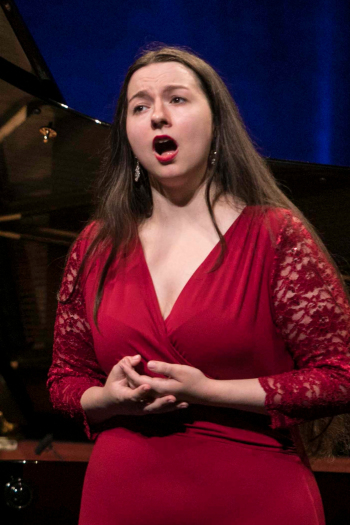 Soprano Agnieszka Kruszyna started her performance with recitative and aria „Temerari / Come scoglio” by W. A. Mozart. Then she was asked to sing the aria „Je suis encore tout étourdie” by J. Massenet. The soloist has a voice with a rich midrange and sharp-sounding top. There was no clear diction in her performance. She seemed very nervous.
Soprano Agnieszka Kruszyna started her performance with recitative and aria „Temerari / Come scoglio” by W. A. Mozart. Then she was asked to sing the aria „Je suis encore tout étourdie” by J. Massenet. The soloist has a voice with a rich midrange and sharp-sounding top. There was no clear diction in her performance. She seemed very nervous.
Kateryna LEVYTSKA | soprano
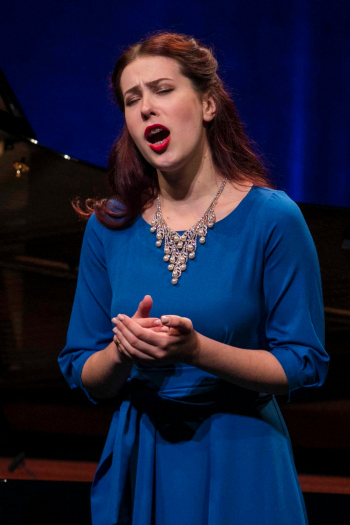 Ukrainian soprano, Kateryna Levytska, entered the stage as the first contestant after the break. She began her performance with W. A. Mozart’s aria „Ah, ich liebte”. The soloist presented herself gracefully on stage. She sang with a sweet-sounding voice and handled this difficult and demanding aria very well. As her second piece, the Jury chose E. Dell'Acqua’s song „Villanelle”. The singer showed musicality and round top notes. There was not enough clear diction in her performance.
Ukrainian soprano, Kateryna Levytska, entered the stage as the first contestant after the break. She began her performance with W. A. Mozart’s aria „Ah, ich liebte”. The soloist presented herself gracefully on stage. She sang with a sweet-sounding voice and handled this difficult and demanding aria very well. As her second piece, the Jury chose E. Dell'Acqua’s song „Villanelle”. The singer showed musicality and round top notes. There was not enough clear diction in her performance.
Avram Benjamin MOLONFALEAN | bass
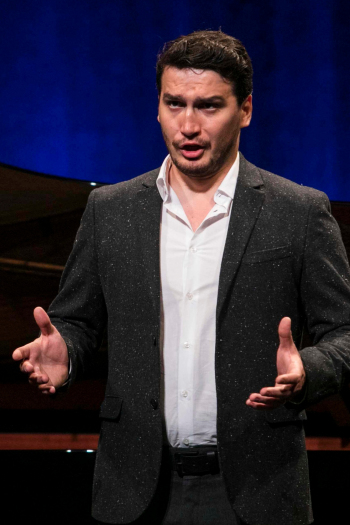 Romanian bass Avram Benjamin Molonfalean started his performance with a recitative and aria „Shto skazet on” by P. Tchaikovsky. His voice sounded beautiful, and although it seemed a bit trapped, the artist seemed to feel comfortable with it. In the second piece – „Eh, consolatevi… Madamina, il catalogo è questo” by W. A. Mozart – the soloist showed ingenuity. He used the festival catalog, opened it on a page with Ada Sari's photo, and then presented it to the audience as a portrait of one of Don Giovanni's beautiful victims.
Romanian bass Avram Benjamin Molonfalean started his performance with a recitative and aria „Shto skazet on” by P. Tchaikovsky. His voice sounded beautiful, and although it seemed a bit trapped, the artist seemed to feel comfortable with it. In the second piece – „Eh, consolatevi… Madamina, il catalogo è questo” by W. A. Mozart – the soloist showed ingenuity. He used the festival catalog, opened it on a page with Ada Sari's photo, and then presented it to the audience as a portrait of one of Don Giovanni's beautiful victims.
Zuzanna NALEWAJEK | mezzo-soprano
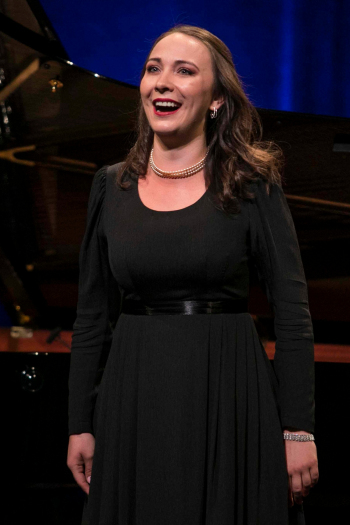 Mezzo-soprano Zuzanna Nalewajek performed H. Wolf’s song „Auf einer Wanderung” and W. A. Mozart’s recitative and aria „Ah! Qual gelido orror / Il padre adorato”. She sang both songs very maturely. She delivered the text very well and painted a whole range of emotions with her voice. At times her pitch was a bit too low.
Mezzo-soprano Zuzanna Nalewajek performed H. Wolf’s song „Auf einer Wanderung” and W. A. Mozart’s recitative and aria „Ah! Qual gelido orror / Il padre adorato”. She sang both songs very maturely. She delivered the text very well and painted a whole range of emotions with her voice. At times her pitch was a bit too low.
Stanisław NAPIERAŁA | tenor
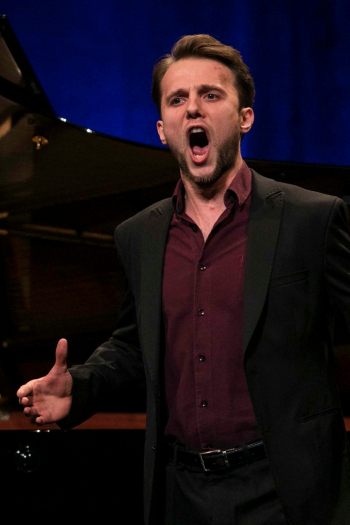 Stanisław Napierała began his performance with O. Respihi’s song „Nebbie” to the poetry of Ada Negri. Together with Grzegorz Biegas accompanying him at the piano, they brilliantly built up tension in long and rising phrases. The soloist had an impressive control over the volume of his voice. In his second piece, W. A. Mozart’s aria „Il mio tesoro”, he presented a beautiful legato. His focused voice sounded firm and vibrant.
Stanisław Napierała began his performance with O. Respihi’s song „Nebbie” to the poetry of Ada Negri. Together with Grzegorz Biegas accompanying him at the piano, they brilliantly built up tension in long and rising phrases. The soloist had an impressive control over the volume of his voice. In his second piece, W. A. Mozart’s aria „Il mio tesoro”, he presented a beautiful legato. His focused voice sounded firm and vibrant.
Wiktoria OSKROBA | soprano
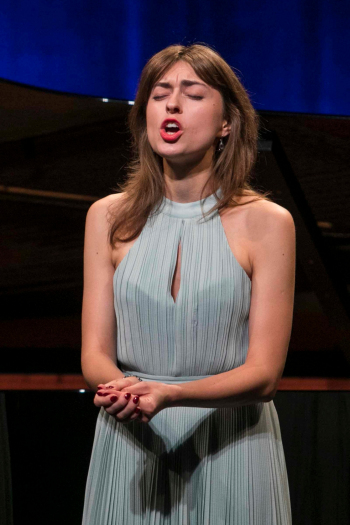 Soprano Wiktoria Oskrobia and pianist Paweł Sommer put the audience in a completely different mood. They started their performance with J. S. Bach’s aria „Aus Liebe will mein Heiland sterben”. They both operated with a delicate and ethereal sound. The soloist sang with a simple and clear voice, perfect for oratorio music. In her second aria, „In faccia all'oggetto” by W. A. Mozart, she showed great culture and intelligence in singing. The soloist has a rather small voice, but with the accompaniment of the piano, her performance was perfectly balanced.
Soprano Wiktoria Oskrobia and pianist Paweł Sommer put the audience in a completely different mood. They started their performance with J. S. Bach’s aria „Aus Liebe will mein Heiland sterben”. They both operated with a delicate and ethereal sound. The soloist sang with a simple and clear voice, perfect for oratorio music. In her second aria, „In faccia all'oggetto” by W. A. Mozart, she showed great culture and intelligence in singing. The soloist has a rather small voice, but with the accompaniment of the piano, her performance was perfectly balanced.
Ewelina OSOWSKA | soprano
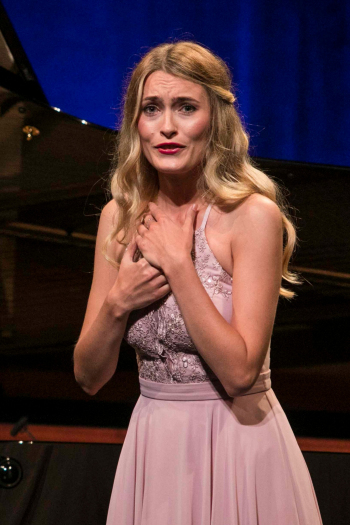 Soprano Ewelina Osowska started her performance with a little known, but very charming and gracefully performed aria „D'ineffabile contento” by A. Cagnoni. As her second piece, the jury chose W. A. Mozart’s aria „O zittre nicht”. The soloist presented light and selective coloratures and beautiful pianos on high notes. Her performance seemed a bit nervous, and with the forte dynamics her top notes sounded sharp and they lacked confidence.
Soprano Ewelina Osowska started her performance with a little known, but very charming and gracefully performed aria „D'ineffabile contento” by A. Cagnoni. As her second piece, the jury chose W. A. Mozart’s aria „O zittre nicht”. The soloist presented light and selective coloratures and beautiful pianos on high notes. Her performance seemed a bit nervous, and with the forte dynamics her top notes sounded sharp and they lacked confidence.
Zoya PETROVA | soprano
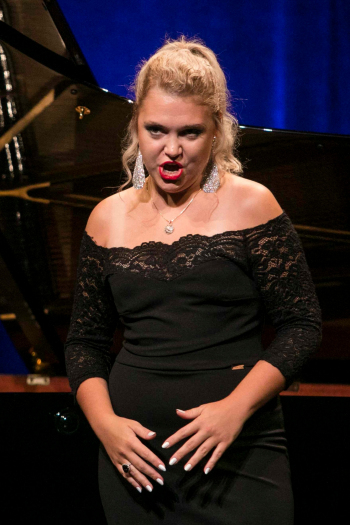 Russian coloratura Zoya Petrova performed the arias „Où va la jeune Hindoue?” by L. Delibes and „O zittre nicht” by W. A. Mozart. The soloist showed a beautiful timbre and the ability to freely interpret the pieces she performed. In the higher registers her voice seemed muffled and not very vibrant.
Russian coloratura Zoya Petrova performed the arias „Où va la jeune Hindoue?” by L. Delibes and „O zittre nicht” by W. A. Mozart. The soloist showed a beautiful timbre and the ability to freely interpret the pieces she performed. In the higher registers her voice seemed muffled and not very vibrant.
Magdalena PLUTA | mezzo-soprano
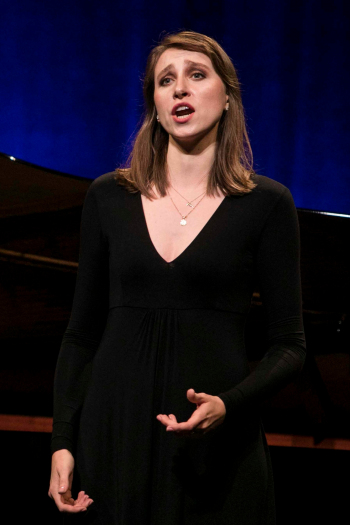 Mezzo-soprano Magdalena Pluta showed a dark and beautiful timbre in pieces „Deh per questo” by W. A. Mozart and „Spring Waters” by S. Rachmaninoff. She sang with a secure sound that resonated the same throughout her whole vocal range. She delivered the text legibly and clearly. Her successful performance would have been even more interesting if the soloist boldly experimented with the use of different colors of her impressive voice.
Mezzo-soprano Magdalena Pluta showed a dark and beautiful timbre in pieces „Deh per questo” by W. A. Mozart and „Spring Waters” by S. Rachmaninoff. She sang with a secure sound that resonated the same throughout her whole vocal range. She delivered the text legibly and clearly. Her successful performance would have been even more interesting if the soloist boldly experimented with the use of different colors of her impressive voice.
Natalia PŁONKA | mezzo-soprano
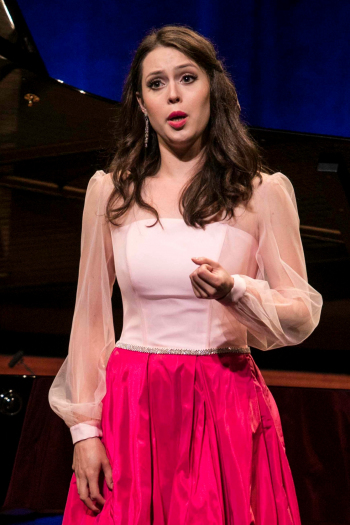 Mezzo-soprano Natalia Płonka started her performance with J. S. Bach’s aria „Erbarme dich”. The soloist sang with a nice sound, but her performance was rather monotonous. In the second piece, „Ah! Qual gelido orror / Il padre adorato” by W. A. Mozart, her voice seemed less supported and at times not very resonant.
Mezzo-soprano Natalia Płonka started her performance with J. S. Bach’s aria „Erbarme dich”. The soloist sang with a nice sound, but her performance was rather monotonous. In the second piece, „Ah! Qual gelido orror / Il padre adorato” by W. A. Mozart, her voice seemed less supported and at times not very resonant.
Maria POLAŃSKA | mezzo-soprano
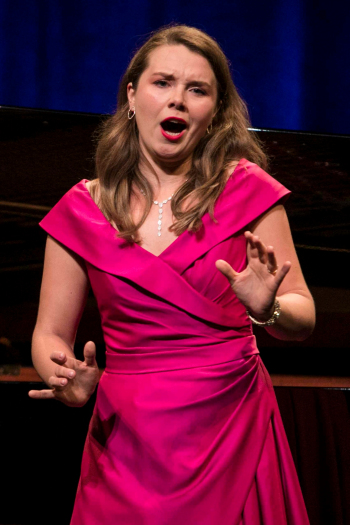 Mezzo-soprano Maria Polańska started her performance with the aria „Lo farò, dirò spietato” by G. F. Händel. The singer has a strong voice, with an uneven timbre. She coped very efficiently with the coloratura passages. In the second piece, „Wer hat dies Liedlein erdacht?” By G. Mahler, a thick vibrato appeared in the singer's voice. The soloist presented interesting interpretations and one could see that she feels confident on the stage.
Mezzo-soprano Maria Polańska started her performance with the aria „Lo farò, dirò spietato” by G. F. Händel. The singer has a strong voice, with an uneven timbre. She coped very efficiently with the coloratura passages. In the second piece, „Wer hat dies Liedlein erdacht?” By G. Mahler, a thick vibrato appeared in the singer's voice. The soloist presented interesting interpretations and one could see that she feels confident on the stage.
David ROY | baritone
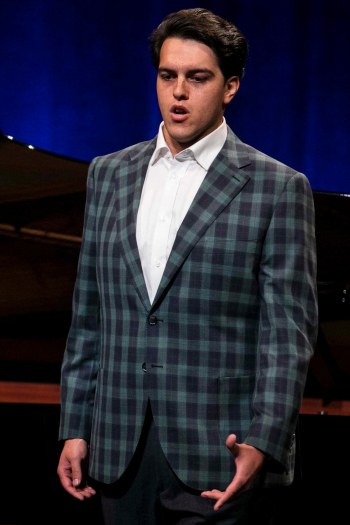 Despite his young age, 24 year old baritone David Roy showed great maturity and technical prowess. The first piece, „Alzati, là tuo figlio / Eri tu che macchiavi quell'anima” by G. Verdi, was sung on a beautiful flowing legato. Both the piano and forte dynamics sounded resonant and uniform. As the second piece, the Jury chose „Hai già vinta la causa / Vedrò mentr'io sospiro” by W. A. Mozart. David Roy captured the whole expression in his voice and pronunciation. The singer's body language was sparse and lofty – perfectly suited to his interpretation.
Despite his young age, 24 year old baritone David Roy showed great maturity and technical prowess. The first piece, „Alzati, là tuo figlio / Eri tu che macchiavi quell'anima” by G. Verdi, was sung on a beautiful flowing legato. Both the piano and forte dynamics sounded resonant and uniform. As the second piece, the Jury chose „Hai già vinta la causa / Vedrò mentr'io sospiro” by W. A. Mozart. David Roy captured the whole expression in his voice and pronunciation. The singer's body language was sparse and lofty – perfectly suited to his interpretation.
Filip RUTKOWSKI | bass
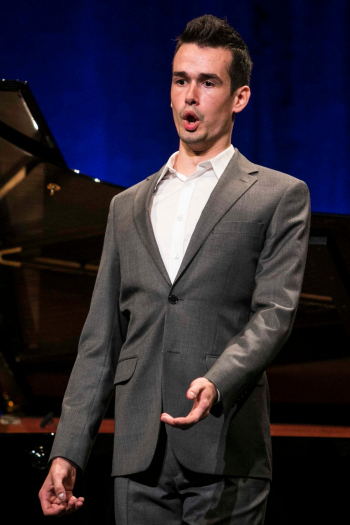 Bass Filip Rutkowski started his performance with a recitative and aria „Voici donc les debris / Nonnes qui reposez” by G. Meyerbeer. Voice of the 22-year-old singer is surprisingly sonorous, and saturated in the low range. He led beautiful legato phrases and delivered the text brilliantly. In his second aria, „In diesen heilgen Hallen” by W. A. Mozart, it could be heard more clearly that the soloist is still very young. The aria of the high priest of Sarastro requires a stable low register and great maturity in interpretation.
Bass Filip Rutkowski started his performance with a recitative and aria „Voici donc les debris / Nonnes qui reposez” by G. Meyerbeer. Voice of the 22-year-old singer is surprisingly sonorous, and saturated in the low range. He led beautiful legato phrases and delivered the text brilliantly. In his second aria, „In diesen heilgen Hallen” by W. A. Mozart, it could be heard more clearly that the soloist is still very young. The aria of the high priest of Sarastro requires a stable low register and great maturity in interpretation.
SeungA RYU | soprano
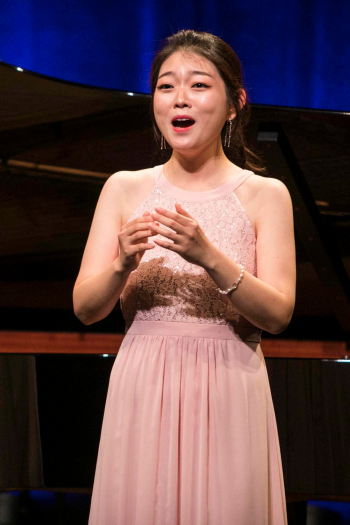 Korean soprano SeungA Ryu presented herself charmingly. She started her performance with Ch. Gounod’s aria „Ah! Je veux vivre dans le rêve”, then she sang W. A. Mozart's aria „Durch zärtlichkeit und Schmeicheln”. Her light voice was a perfect match for the chosen repertoire and one could see that the singer feels at home in it. In places, she had problems with intonation.
Korean soprano SeungA Ryu presented herself charmingly. She started her performance with Ch. Gounod’s aria „Ah! Je veux vivre dans le rêve”, then she sang W. A. Mozart's aria „Durch zärtlichkeit und Schmeicheln”. Her light voice was a perfect match for the chosen repertoire and one could see that the singer feels at home in it. In places, she had problems with intonation.

